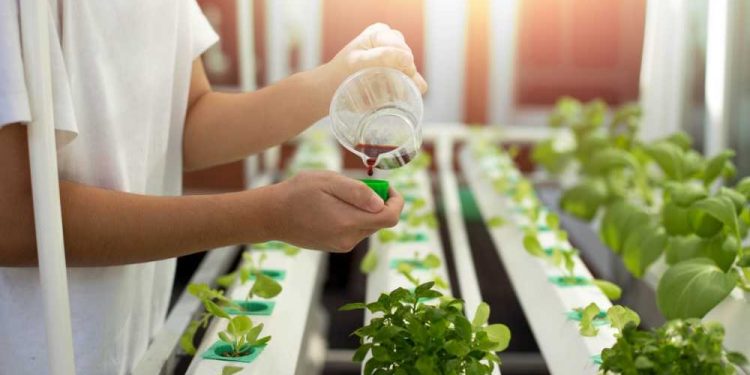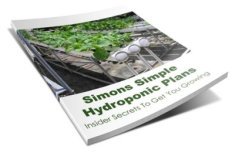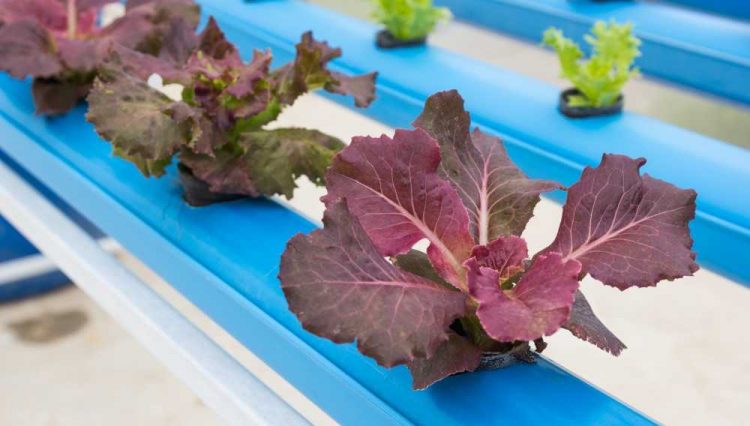With hundreds of different hydroponic fertilizer formulas, there is little chance that you can go wrong when you choose to make a nutrient at home. The other option is to buy fertilizers from the market based on availability, preference of fruits and vegetables, and affordability. Both options work very well. All you need is a bit of experience.
Some hydroponic plants have specific nutrient requirements that vary over a period of time. It’s difficult to improvise with fertilizers without a system in place. If you get hold of the right hydroponic system that caters to your immediate project needs, you’ll enjoy this hobby to the fullest.
Cheap Hydroponic Nutrients to Brew
Beginners often choose home-made hydroponic nutrients in their initial projects. They’re easy to brew and require the addition of fertilizer to water, or so it seems.
Hydroponic plants are nourished by nutrients in this solution and do not depend on nourishment found in the soil. Therefore, the wrong choice of hydroponic fertilizer leads to a poor crop that is likely to affect confidence and brings in those little doubts that may dissuade you from taking up your next hydroponic project.
There are limits as to how you can monitor the precise proportion of nutrients and water at the different stages of a plant’s growth. What you need is a hydro system to automate this process.
If you follow the right system, this process can be built from the ground up without much effort. Look out for side effects, quality of output, and establish the right balance between the quantity of nutrients and growth.
Choose the Right Fertilizer Salts
Easily available fertilizer salts have made it possible for even a hobbyist to pursue hydroponic projects with quickly assembled systems and nutrients supplied by gardening stores, local agricultural agencies, nurseries, and plant food suppliers.
You need to organize yourself in order to make the right choice of fertilizer, as most of these salts are sold in 50-lb. bags that may cost a bit and may be more than what you need for your initial home hydroponic project.
How to make the typical liquid fertilizer at home
For some kinds of hydroponic plants, cheap liquid fertilizers can be brewed at home.
It makes sense to use ingredients readily available in or around the house. For example, you can use worms or compost to make your first fertilizer.
- Take a pound of worms or a gallon of compost, then add it to a 5-gallon bucket of water.
- Stir the mixture until an even fluid is formed.
- Provide air throughout the mixture by using a fish tank air pump.
- Allow the mixture to settle for around three days.
- Keep it away from sunlight, and make sure you stir the brew every now and then.
- Remove solids still left behind by passing the brew through a disposable filter.
- Begin using this fertilizer for your project.
Advanced Fertilizers for Serious Hydroponic Enthusiasts
The advantage of using commercial hydroponic fertilizer is you can choose the recommended nutrient based on what you plan to grow, the hydroponic system you employ, and advanced techniques available at your disposal. Usually, the manufacturer outlines the exact proportion of fertilizer to be added to water for maximum yield.
Basically, the fertilizer must contain 20 or more nutrients for these plants to grow. Oxygen, carbon, and hydrogen are absorbed directly from the water and air. However, other elements like nitrogen, calcium, chlorine, and sulfur must be added to the nutrient solution.
Fertilizers in the form of pre-formulated hydroponic concentrates usually contain all these essential elements. Just follow guidelines offered by the supplier or follow expert tips, plans, and secrets that show you where you can buy fertilizers from local outlets.
Suppliers stock nutrients capable of nourishing all sorts of hydroponic plants. You’ll need just one hydroponic solution to grow all kinds of vegetables and fruits at home or in your garden. This makes it easier to calculate the proportion of concentrate needed to sustain an entire crop.
Buy cost-effective fertilizer concentrates in quarts and gallons. It’s a good idea to buy a pH control kit to monitor the nutrient value in your solution on a regular basis. Hard water concentrates are sold separately and are usually needed if calcium content in the water exceeds 70 ppm.
Eventually, you will need a hydroponic fertilizer that is ideally suited to grow plants you choose for your project. There is scope to improvise, as you get better acquainted with fertilizers available in nearby home depots. Look for brands specified by the experts to lower cost and save time.


